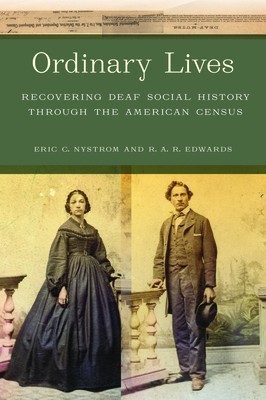
- We will send in 10–14 business days.
- Author: Eric C Nystrom
- Publisher: University of Massachusetts Press
- ISBN-10: 1625347634
- ISBN-13: 9781625347633
- Format: 15 x 21.8 x 2.3 cm, minkšti viršeliai
- Language: English
- SAVE -10% with code: EXTRA
Reviews
Description
The collective social history of deaf people in America has yet to be written. While scholars have focused their attention on residential schools for the deaf, leaders in the deaf community, and prominent graduates of these institutions, the lives of "ordinary" deaf individuals have been largely overlooked.
Employing the methods of social history, such as the use of digital history techniques and often-ignored sources like census records, Eric C. Nystrom and R. A. R. Edwards recover the lived experiences of everyday deaf people in late nineteenth century America. Ordinary Lives captures the stories of deaf women and men, both Black and white, describing their family lives, networks of support, educational experiences, and successes and hardships. In this pioneering "deaf social history," Edwards and Nystrom reconstruct the biographies of a wider range of deaf individuals to tell a richer, more nuanced, and more inclusive history of the larger American deaf community.
EXTRA 10 % discount with code: EXTRA
The promotion ends in 23d.00:50:37
The discount code is valid when purchasing from 10 €. Discounts do not stack.
- Author: Eric C Nystrom
- Publisher: University of Massachusetts Press
- ISBN-10: 1625347634
- ISBN-13: 9781625347633
- Format: 15 x 21.8 x 2.3 cm, minkšti viršeliai
- Language: English English
The collective social history of deaf people in America has yet to be written. While scholars have focused their attention on residential schools for the deaf, leaders in the deaf community, and prominent graduates of these institutions, the lives of "ordinary" deaf individuals have been largely overlooked.
Employing the methods of social history, such as the use of digital history techniques and often-ignored sources like census records, Eric C. Nystrom and R. A. R. Edwards recover the lived experiences of everyday deaf people in late nineteenth century America. Ordinary Lives captures the stories of deaf women and men, both Black and white, describing their family lives, networks of support, educational experiences, and successes and hardships. In this pioneering "deaf social history," Edwards and Nystrom reconstruct the biographies of a wider range of deaf individuals to tell a richer, more nuanced, and more inclusive history of the larger American deaf community.


Reviews